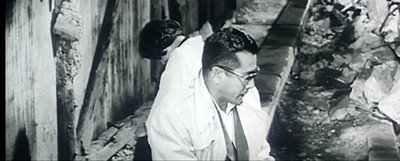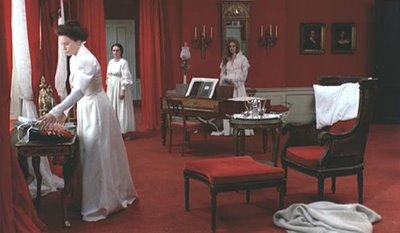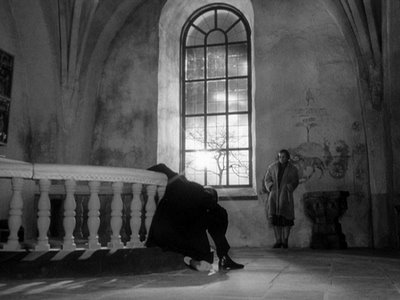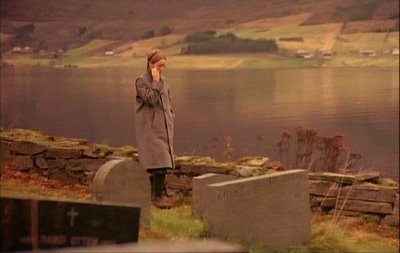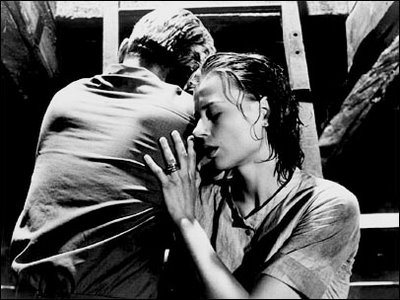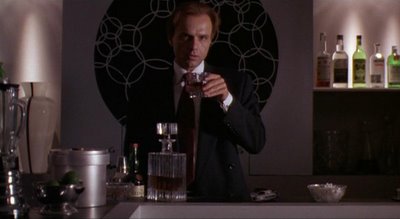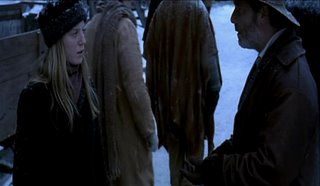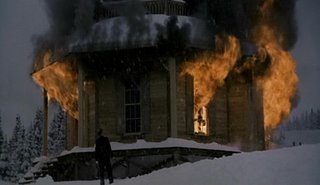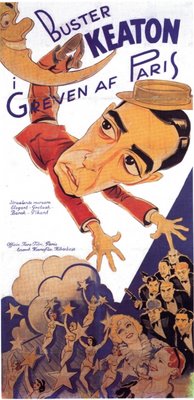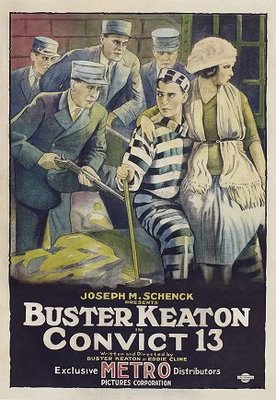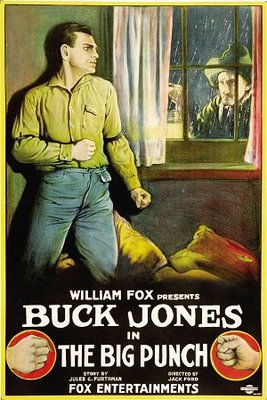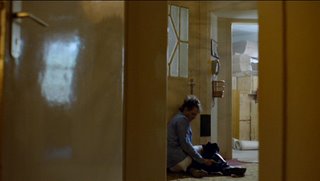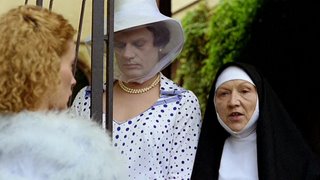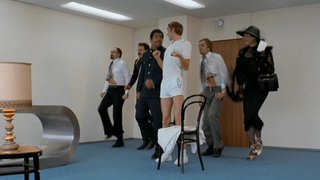Melville's film resume is of high quality right across the board, but there are a lot of these gems are pretty hard to find. The WW2 drama Army of Shadows has just had a re-release after many, many years of languishing unseen. Which brings me to today's topic, Melville's terrific 1963 film Magnet of Doom, based on a Georges Simenon novel. This one is also virtually unseen in anything but low-quality, washed out additions. More on that later.
The hero of MoD, for lack of a better word, is Michel Maudet, a down and out boxer played by Jean-Paul Belmondo. As the film opens , Maudet is fighting (and losing) his final match, later pondering just what he is going to do with the rest of his life. Maudet is a man who feels that scruples are just something that gets in the way. He coldly takes a pendant from his girl for the purpose of pawning it, and when the pawnbroker won't give him anything for it, he gives it back to her, telling her he couldn't go through with it. He's a louse, pure and simple.
While all this is going on, we meet the film's other main character, the powerful banker Dieudonne Ferchaux. (Charles Vanel) From a heated board meeting, we gather that Ferchaux is facing serious problems with the law, related to the murder of three black men years before in Africa. The details of the legal trouble are hard to follow, and in fact, they aren't important. This scene is mainly to establish Ferchaux as a man who is in trouble, but still expects things to be done his way. He makes it plain that he has no intention of going to jail, and is not above threatening any of his subordinates who might get in his way.

Needing to get out of the counrty quickly, Ferchaux has to hire a secretary on the fly, and that's how he and Maudet join forces. The two men escape on a flight to New York, and when we see Ferchaux recover a suitcase full of cash from his safe, another level of intrigue clicks into place. It would logical to assume that the film will be about the two unscupulous men competing over the money. That theory is basically correct, but it's not what the movie is really about.

It's only when the two men leave New York that MoD really hits its groove. During the New york scenes, Melville has wisely kept the mens relationship as strictly professional - Boss and secretary. In the car together, the two start to feel each other out a bit, and there's a pivitol early scene in a diner where Maudet fights (and beats) two American soldiers. The dymanic has changed a bit now, and as the two men drive on, Ferchaux looks at his young companion differently. The true heart of Magnet of Doom is the relationship between the two men. There are suggestions of a father-son dynamic, but there is also an unmistakable undercurrent of competition, as the two vie for dominance.
 Maudet stops to pick up a young female hitch-hiker (against Ferchaux's wishes) ,and it's here that the dominance scales tip the other way. The younger man forces Ferchaux to move to the back seat, and makes him wait in the car while he makes love to the girl . Ferchaux has his own method of tipping things back, however. He goes and scatters the money down a hillside, and when asked by Maudet why he would do such an insane thing, he replies "Because I want to be in control of the situation."
Maudet stops to pick up a young female hitch-hiker (against Ferchaux's wishes) ,and it's here that the dominance scales tip the other way. The younger man forces Ferchaux to move to the back seat, and makes him wait in the car while he makes love to the girl . Ferchaux has his own method of tipping things back, however. He goes and scatters the money down a hillside, and when asked by Maudet why he would do such an insane thing, he replies "Because I want to be in control of the situation."

The twosome eventually winds up in New Orleans, and it's here that the film settles down and gets to the business of the two men and the money (Which Maudet had to gather up). Ferchaux is by now feeling ill, and is confined to their rented house. Maudet, meanwhile, is openly defiant of the old man, and frequents a local bar instead of nursemaiding.
Throughout the car ride, there was one big obvious question that the viewer asks himself. Namely, "Why doesn't Maudet just take the money?" There isn't any indication that Maudet has ever thought that himself, but there's a bartender named Jeff who puts it on the table. This character (Todd Martin) is an interesting addition to the mix. He's clearly American, yet speaks flawless French. He seems inordinately interested in what the old man is doing, and whether or not Maudet is going to be with him. He is pretty transparent - even to Maudet, and eventually, he lays it out.
"Did you ever think of knocking him out and just taking it?"
"Taking what?"
"The money."
A voice-over finally lets us inside Maudet's thoughts and we learn that yeah, he has thought about it. The Jeff character is clearly meant to represent a dark alter ego to Maudet. They seem to have a connection bourne out of the fact that they are the only two who speak French, and also their shared willingness to use others to profit themselves.
The final stages of the film are pretty much inevitable, as a play is made on Ferchaux and his money. I will stop short of giving away the ending, but will say that it is a bit of an anti-climax. (To me, anyway). The heart and soul of MoD is the relationship between the two men. Maudet wants what Ferchaux has - Power and wealth, and in that regard, wants the older man's favour. On the other hand, he resents Ferchaux's assumed superiority over him.
I thought of the great Henri Clouzot film The Wages of Fear while watching this. In that one an older gangster (Vanel again) crumbles while hauling nitro-glycerine though a treacherous mountain pass, while a potent younger man (Yves Montand) begins to dominate him. This film is not of that caliber, but it's very good, and if you're a Melville fan, try to seek it out.
Notes: I said at the top that Magnet of Doom wasn't really available in a quality addition. That would be obvious from my stills, which were taken from a DVD-R that I located.. What I watched was essentially a B&W film. Here's to hoping that we see a good quality DVD sometime soon.
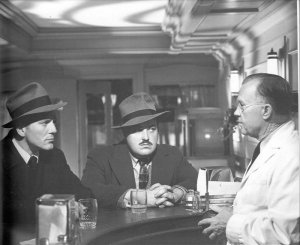
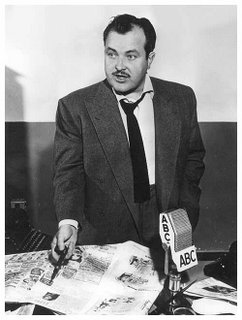

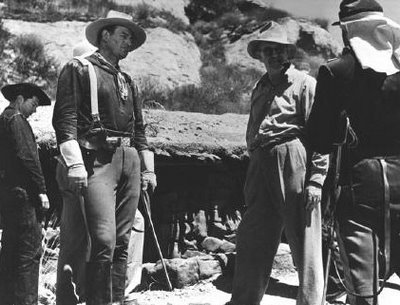
 She turns away. Her disability is accentuated.
She turns away. Her disability is accentuated.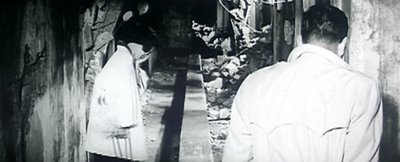 Nishi goes after her, feeling remorse for this woman who he has used. It's the first time that Mifune's Nichi has seen himself as anything but a righteous avenging angel.
Nishi goes after her, feeling remorse for this woman who he has used. It's the first time that Mifune's Nichi has seen himself as anything but a righteous avenging angel. 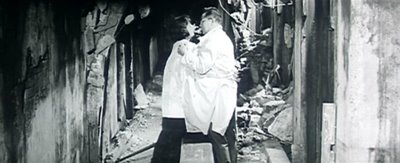 They kiss. Note the bench between them.
They kiss. Note the bench between them.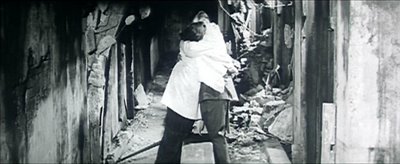 They drop to seated positions.
They drop to seated positions.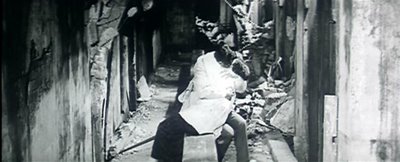 Nishi now gets up; Yoshiko tells him that despite everything, she can’t hate her father.
Nishi now gets up; Yoshiko tells him that despite everything, she can’t hate her father.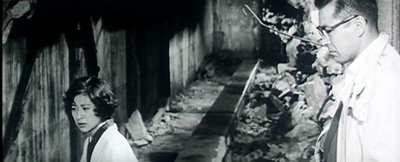 Nishi sits, facing away from her now, and tells the story of his illegitimate father, and his suicide. During the course of this monologue, any possibility of pity dissolves.
Nishi sits, facing away from her now, and tells the story of his illegitimate father, and his suicide. During the course of this monologue, any possibility of pity dissolves.